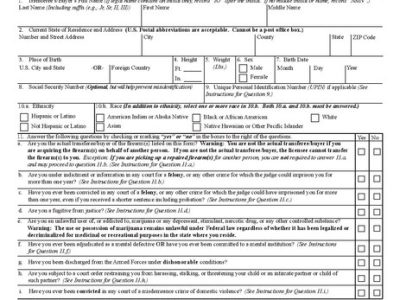Who Should I List in My Trust?
Estate-planning documents such as wills are familiar to most people. The main actors in a will are the executor and the beneficiary. In a will, the executor handles disbursement of property and the beneficiaries inherit the property. In a firearms trust, however, there are other roles that need to be considered, both while the initiator is alive and after their death. Understanding these roles is especially important when the property is restricted under the National Firearms Act.
The ATF issues tax stamps for restricted weapons and accessories to individuals, corporations, or trusts. As a trust is considered its own legal entity, when a Form 1 or Form 4 is applied for by a trust the tax stamp will list the trust name. A gun trust designates a primary individual who directs the trust, often called the Primary Trustee. It also lists Co-trustees and Beneficiaries.
The Primary Trustee is the only person who manages trust property and is the only one who can alter the trust while they are living. By listing other individuals in the trust, however, the Primary Trustee has control over who may possess and use the trust property during their lifetime, and who inherits the property upon their death.
Co-Trustees
Function of Co-trustees
Co-trustees are the individuals designated by the Primary Trustee to possess and use the trust property while they are still alive. If the Co-trustee is listed on the trust and carries the tax stamp, they may possess the NFA item without the presence of the Primary Trustee. A good example of this is if the Primary Trustee lends a suppressor to a Co-trustee to go hunting. If questioned about possession, the Co-trustee should show a copy of the tax stamp and the trust to prove that they are in legal possession (a digital copy of the trust would suffice).
Given the changes to the definition of “responsible persons” following the passage of 41F, any active co-trustee must go through processing with the ATF. However, the Co-trustee list may be altered at any time, which may lessen the burden of suppling information to the ATF for each and every one of your tax stamps. For further information regarding this issue, please refer to our website: https://nfalawyers.com/new-41f-update-nfa-lawyers-clients.
Legal Status and Age
The Co-trustees listed in a trust must be over the age of 18 and legally able to possess firearms. They must not have a criminal history that prohibits them from possessing weapons. Many people are unaware that certain non-felony charges, such as family violence misdemeanor convictions, can restrict their possession rights. Involuntary admissions to mental institutions also disqualify an individual from possessing firearms and restricted NFA items.
As the Primary Trustee may not know whether a close friend or family member has certain criminal charges or institutional admissions in their past, it is ultimately the responsibility of the potential Co-trustee if they choose to take possession of trust property when not legally able to do so.
State of Residence
Co-trustees do not have to live in the same state as the Primary Trustee. Co-trustees can live in any state, even states that have strict gun laws. For example, if your Co-trustee lives in New York where NFA items are strictly prohibited, you may list that individual in your trust. That person is still able to possess your NFA item, but they must do so in a state where that item is legal.
Beneficiaries
Function of Beneficiary
The function of a Beneficiary is to inherit trust property when the Primary Trustee passes away. Beneficiaries have no possession or use rights while the Primary Trustee is living. For an individual to both use the item while you are living and inherit it after your death, they must be listed in both positions. Since Beneficiaries cannot possess the items in your trust while you are living, the ATF does not view them as “responsible persons,” so their information and fingerprints would not need to be submitted when applying for a tax stamp.
The trust remains intact upon the death of the Primary Trustee, so there is no transfer of the tax stamps into the Beneficiary’s name; the tax stamps remain in the name of the trust. If the Beneficiary chooses to transfer the items out of the trust, they may do so via a Form 5 transfer.
Legal Status and Age
Unlike Co-trustees, Beneficiaries may be any age. If a minor Beneficiary inherits a weapon, the Co-trustee would hold the item until the Beneficiary comes of age. Beneficiaries are also responsible for knowing whether or not they may legally possess the trust property. If they are unable to take possession of the property due to criminal history or involuntary commitment to a mental institution, the Co-trustees may hold the weapons.
State of Residence
Like Co-trustees, Beneficiaries may also reside in any state. If the beneficiary lives in an NFA-unfriendly state, they will not be able to take the NFA items back to their home after the death of the Primary Trustee because possession of those items remains prohibited in that state. This type of situation often necessitates traveling to the Primary Trustee’s state to take possession of the item and then selling it to an FFL in that state before returning home.
Even in light of the restrictions due to 41F and the varying laws of different states, NFA trusts remain the gold standard for maintaining and passing on firearms collections. Not only does a trust allow others to possess and use the items during the lifetime of the Primary Trustee, it makes estate management of the property safe and easy, keeping your Beneficiaries in compliance with the law.



 What are NFA Weapons?
What are NFA Weapons?